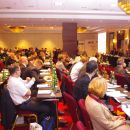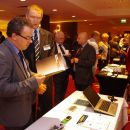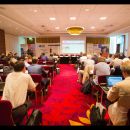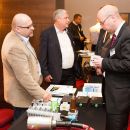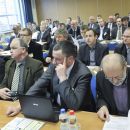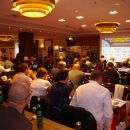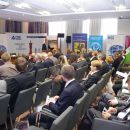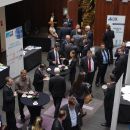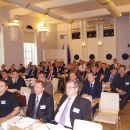| Article Index |
|---|
| Start |
| Previous editions |
| Sponsors |
| Honorary Patrons |
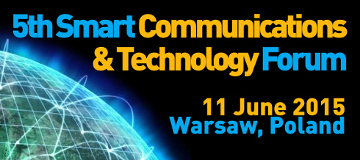
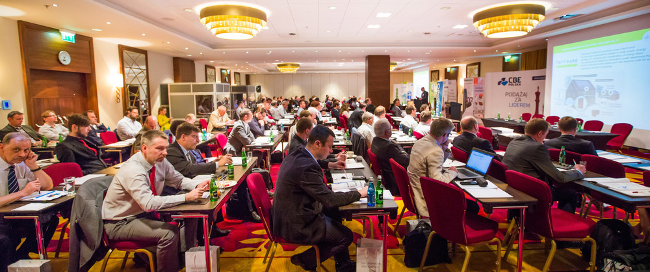
Simon Hill, OPOWER: "Utility sector needs new Quality in communication with the Consumer"
For the 5th time we had a pleasure of hosting the Smart Communication and Technology Forum. The 5th edition took place on 11th of June in Mariott Hotel in Warsaw. We had almost 200 experts on the panel from all over Europe. OPOWER was our main partner and sponsor, joined by Mikronika, Elgama Elektronika, KIC Innoenergy. Our panelists included: Hicron Group, AP Systems, Inepro, WAGO.
Honorary patronage provided by: SEDC - Smart Energy Demand Coalition, ČTPSG - Česká technologická platforma Smart Grid, Platforma IUSER, The Israeli Smart Energy Association ISEA, OSGP Alliance - The Open Smart Grid Protocol, Polish Information Processing Society - PTI, BESTGRID, UKE i Ministry of Digital Affairs, with cooperation from: Tauron Dystrybucja, CEZ, Veolia Energia Warszawa, Fortum, PIIT, RWE Deutschland AG, PREdistribuce. Translation provided by: Bireta; Media coverage by Polish Press Agency (PAP).
We opened the Forum with a speech delivered by Kai'a Tullis, Policy Officer in the Smart Network Department in DG Energy for European Commission in Luxemburg. The speaker covered the latest implantation solutions and future "smart" investments in Europe.
Simon Hill, vice-president of OPOWER and our main partner in the event, discussed the recent transformation processes in the public sector and OPOWER’s propositions to increase the effectiveness whilst maintaining maximum profitability. One element seemed to be especially underlined in that speech. Public utility companies underwent quite a significant transformation. Due to the development of new IT and communication technologies, possibilities of cooperation with customers have recently grown rapidly. Western European countries are a clear example of how the tendencies in public sector have changed in recent years, mostly regarding the development of new services for customers. It is also more and more common these days that new business entities emerge to offer new solutions and approach in communicating with the end consumer. It is certainly surprising that high-budget market giants are often far behind smaller but more innovative companies. The conclusion seems to be that the key is not wealth and amount of assets but the swiftness of implementation of new solutions and dynamic reactive approach to consumer needs.
As an example we could cite the report drafted by Switch from United Kingdom. The subject of the report was an evaluation of consumer satisfaction with their energy providers. The so-called "Big Six" (Centrica, EDF, E.ON, nPower, Scottish Power, SSE ), companies with an established reputation and position, scored quite low. Whereas, companies that have entered the market within the last 5-10 years scored much higher.
According to the study by Accenture, the actual contact between the consumer and provider lasts for about 9 minutes per year. Therefore, it is crucial and most challenging for companies to use that time effectively by acquiring information about the consumer and her/his needs and to minimize the energy consumption whilst maintaining profitability. Energy effectiveness of companies can be improved through "Demand Side Response" or by decreasing the high-level demand for electric energy. Just few years back, brand recognition for energy providers had little importance for the consumer. Due to changes in the ICT sector, and the introduction of Third Party Access (TPA) rule, the market began to evolve, increasing the potential for development and investment. According to the study by OPOWER, public utility companies may profit additionally even 40 Euro per year on each client, if only they manage to engage their client in conscious energy consumption. OPOWER is capable to identify 12 areas for improvement in order to achieve that goal, such as: analyzing the data collected by smart meter, introducing innovation to smart network and simultaneously decreasing the number of black-outs. As a result of OPOWER solutions , any given energy provider can increase the profit on consumer contracts by 25-55%. The range of possibilities is immense and many companies that use smart meters are still incapable to utilize 100% of possibilities offered by this technology. Similarly interesting is the report created by PWC and ING Bank Śląski on public utility market and what new strategies could be introduced to fully take advantage of the possibilities of smart grid. For instance, for the client the most important objective is the low price of energy. However, provider’s profit margin can be increased if the consumer receives additional, innovative services and clear regulations. The client, who consciously is aware of the value and functionality of new services, will be willing to pay more for them.
The following lecture in the Forum was about Smart Grid in Poland. Dr inz Tomasz Kowalak, advisor to CEO of URE in the Center of Smart Grid Development and Coordination, outlined and analyzed the technical specifications for AMI systems and its influence on the market. Dr. Rafał Mrówka, CEO of KIC InnoEnergy Poland Plus, discussed the support provided by KIC InnoEnergy when introducing innovative solutions.
After a brief coffee break, the conference was divided into two parallel sessions. On Smart Technology we had as a moderator Józef Modelski, chairman of IUSER platform director of Radioelectronics Institute, Warsaw University of Technology, and as speakers: Mariusz Jurczyk TAURON Dystrybucja; Pan Jacek Koźbiał, representing our strategic partner Mikronika and Eva Polanská, Project Manager Clean Technologies - ČEZ.
On Modern Utility we had as a moderator Alicia Carrassco representing Smart Energy Demand Coalition and director of regulations for Spanish branch of Siemens Smart Grid, and as speakers: Amos Lasker, chairman of Israeli Smart Energy Association, Dr Nerijus Kruopis, vice-chairman for technology Elgama Elektronika from Lithuania (strategic partner of the conference) and Paweł Balas, Project Director ICT in Veolia Energia Warsaw.
Afterwards we had an open panel debate - Conference Room A panelists: Mariusz Jurczyk (Tauron), Bo Normark (KIC InnoEnergy), Amnon Shpira (Independent Expert), oraz Jacek Koźbiał (Mikronika) and Conference Room B panelists: Johan Ander (Fortum), Dr Nerijus Kruopis (Elgama Elektronika), Paweł Balas (Veolia), and Dr Marek Maniecki (PIIT).
After lunch all participants were invited again to the main conference room for a case study: "RWE Deutschland implements the intelligent low-voltage electricity grid" by Jana Guenther from RWE Deutschland AG.
Followed by Johan Ander Smart City Program Manager from Swedish Fortum discussing new solutions for private homes and smart grid. Our last speaker was Ing. Martin Vycpálek representing Smart Grid Department in PREdistribuce.



































































































































































































































































After a brief coffee break, the conference was divided into two parallel sessions. On Smart Technology we had as a moderator Józef Modelski, chairman of IUSER platform director of Radioelectronics Institute, Warsaw University of Technology, and as speakers: Mariusz Jurczyk TAURON Dystrybucja; Pan Jacek Koźbiał, representing our strategic partner Mikronika and Eva Polanská, Project Manager Clean Technologies - ČEZ.
On Modern Utility we had as a moderator Alicia Carrassco representing Smart Energy Demand Coalition and director of regulations for Spanish branch of Siemens Smart Grid, and as speakers: Amos Lasker, chairman of Israeli Smart Energy Association, Dr Nerijus Kruopis, vice-chairman for technology Elgama Elektronika from Lithuania (strategic partner of the conference) and Paweł Balas, Project Director ICT in Veolia Energia Warsaw.
Afterwards we had an open panel debate - Conference Room A panelists: Mariusz Jurczyk (Tauron), Bo Normark (KIC InnoEnergy), Amnon Shpira (Independent Expert), oraz Jacek Koźbiał (Mikronika) and Conference Room B panelists: Johan Ander (Fortum), Dr Nerijus Kruopis (Elgama Elektronika), Paweł Balas (Veolia), and Dr Marek Maniecki (PIIT).
After lunch all participants were invited again to the main conference room for a case study: "RWE Deutschland implements the intelligent low-voltage electricity grid" by Jana Guenther from RWE Deutschland AG.
Followed by Johan Ander Smart City Program Manager from Swedish Fortum discussing new solutions for private homes and smart grid. Our last speaker was Ing. Martin Vycpálek representing Smart Grid Department in PREdistribuce.






































































































































































































































































